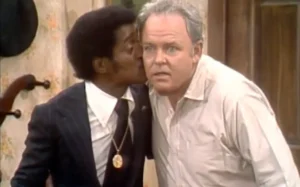
All in the Family was the story of a working-class man and his family experiencing changing times in 1970s New York. The series ran for nine seasons and never shied away from controversial topics but CBS executives got so nervous about one All in the Family episode that they censored it before it even hit the airwaves. So what was the most controversial episode of a controversial show? Which All in the Family episodes were censored and who played the draft dodger on the series?
Now Archie Bunker was the quintessential curmudgeon pushing back against social reform, and his long-suffering wife Edith became an unlikely hero in the fight for women’s liberation. Plenty of viewers thought the show took things too far but just as many said they didn’t go far enough. You won’t want to miss this shocking tale of the All in the Family episode that was too hot for TV, so without further ado, it’s time to stroll back down memory lane.
An all-American family
When Norman Lear read an article in TV Guide about the popular British sitcom Till Death Us Do Part, he instantly recognized similarities to his own family. CBS was interested in buying the show’s rights as a starting vehicle for Jackie Gleason, but Lear beat them to it and offered the show to ABC. Norman shot two pilots starring Carroll O’Connor and Jean Stapleton but the network brass didn’t pick the show up.
ABC had just canceled the sketch show Turn On after one episode and was hesitant to take a chance on a show with a foul mouth bigoted lead. All in the Family was TV’s 34th most-watched show during its inaugural season but climbed to the top of the Nielsen ratings during summer reruns and it remained there for an unprecedented five seasons.

Unlike CBS’s rural comedies, the series focused on controversial topics previously considered taboo on network series – stuff like racism, homosexuality, women’s liberation, abortion, and the ongoing war in Vietnam. In the Watergate tapes former President Nixon discussed the season one episode “Judging Books by Covers,” in which Archie discovers that one of his best friends is gay. Tricky dick believed the show was trying to downgrade him and make the square hard hat out to be bad; he also feared the show would corrupt children just as Socrates once did in ancient Greece. Nixon’s domestic policy chief John Ehrlichman responded that Socrates “never had the influence that television had.”
What was the most controversial episode of ‘All in the Family?’
Picking the most controversial or best episode of any long-running series is tough but we found plenty of bloggers willing to give it a shot. The writers at Gold Derby ranked “Sammy’s Visit” number one. The episode features the legendary Sammy Davis Jr. stop by 704 Hower Street to retrieve the briefcase he left in Archie’s cab. When Sammy surprises Archie with a kiss on the cheek at the end of the episode it received one of the longest laughs in TV history.
Voters on the website Episode Ninja ranked “The Bunkers and the Swingers” number one. Edith answers a personal ad from a couple seeking new friends and hilarity ensues as she gradually figures out why they are so friendly: “I don’t want no creepos, weirdos or sexos in my house, come on.”
Meanwhile Nathan Sharp at Screen Rant ranked “Weekend in the Country” from season nine as the show’s worst episode. In this one, Jean Stapleton had already announced her intention to leave the show, believing the series had run its course and viewers weren’t crazy about the episode’s played-out storyline, which revolved around a heated argument over a Monopoly game during a camping trip. trip.
‘All in the Family’ censored none of the deodorized bigotry, by order of Norman Lear
Norman Lear’s father often told his mother to stifle herself and referred to him as “the laziest white man I ever saw.” Of course, both became Archyisms that found their way onto the show and Lear aspired to purge bigotry by helping viewers recognize it in their own lives. A disclaimer ran before each episode that said the show “seeks to throw a humorous spotlight on our frailties, prejudices, and concerns by making them a source of laughter. We hope to show in a mature fashion just how absurd they are.”
A novel about anti-Semitism entitled Gentleman’s Agreement was adapted into an Oscar-winning film in 1947 and author Laura Z. Hobson came out of retirement in 1971 to publish a 5,000-word critique of All in the Family. Her specific complaint about the bigotry was “there’s not enough of it.” Hopson argues that despite Archie’s frequent use of racial and ethnic slurs throughout the show he doesn’t actually use the preferred nomenclature of American bigots.
